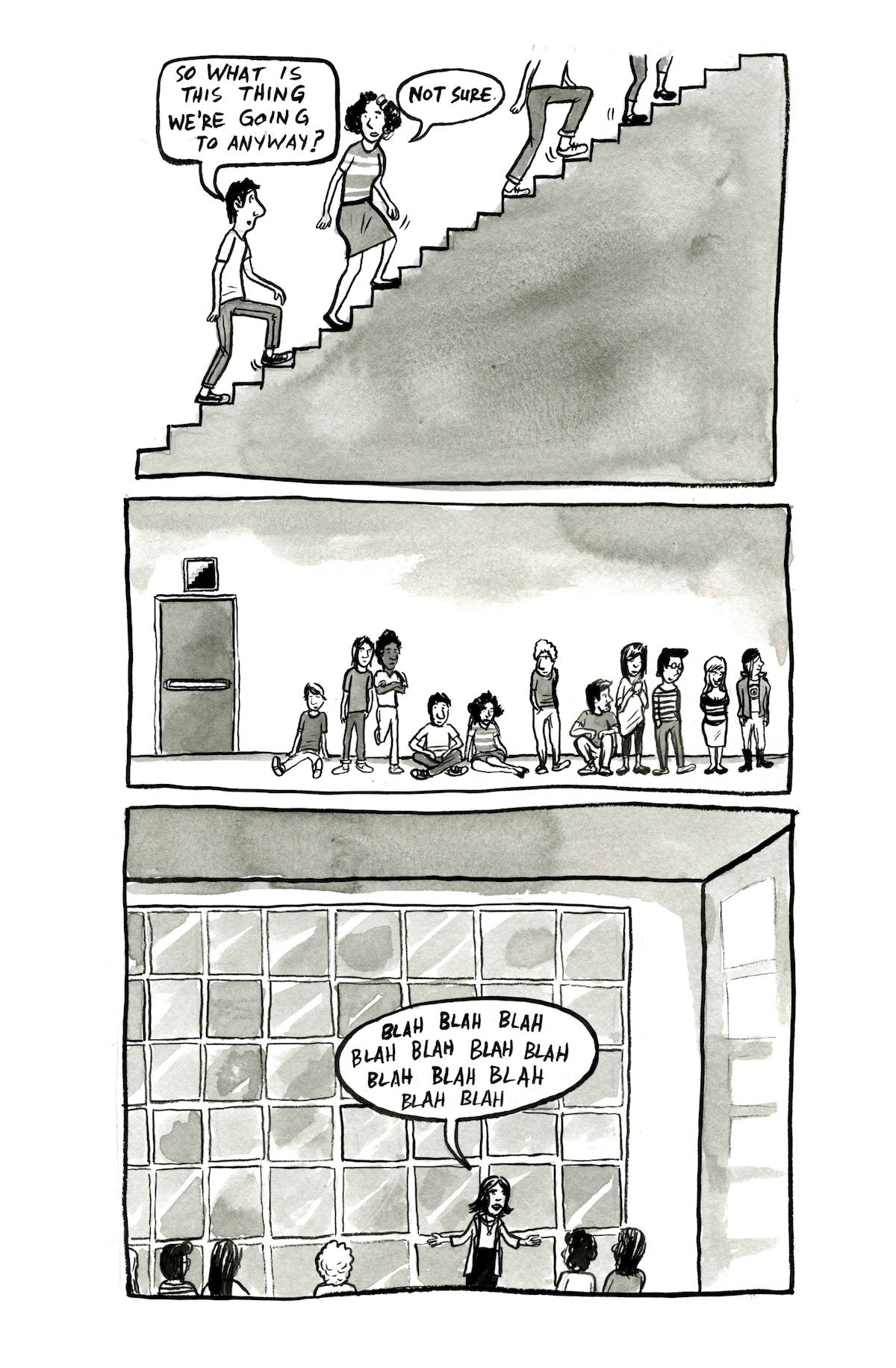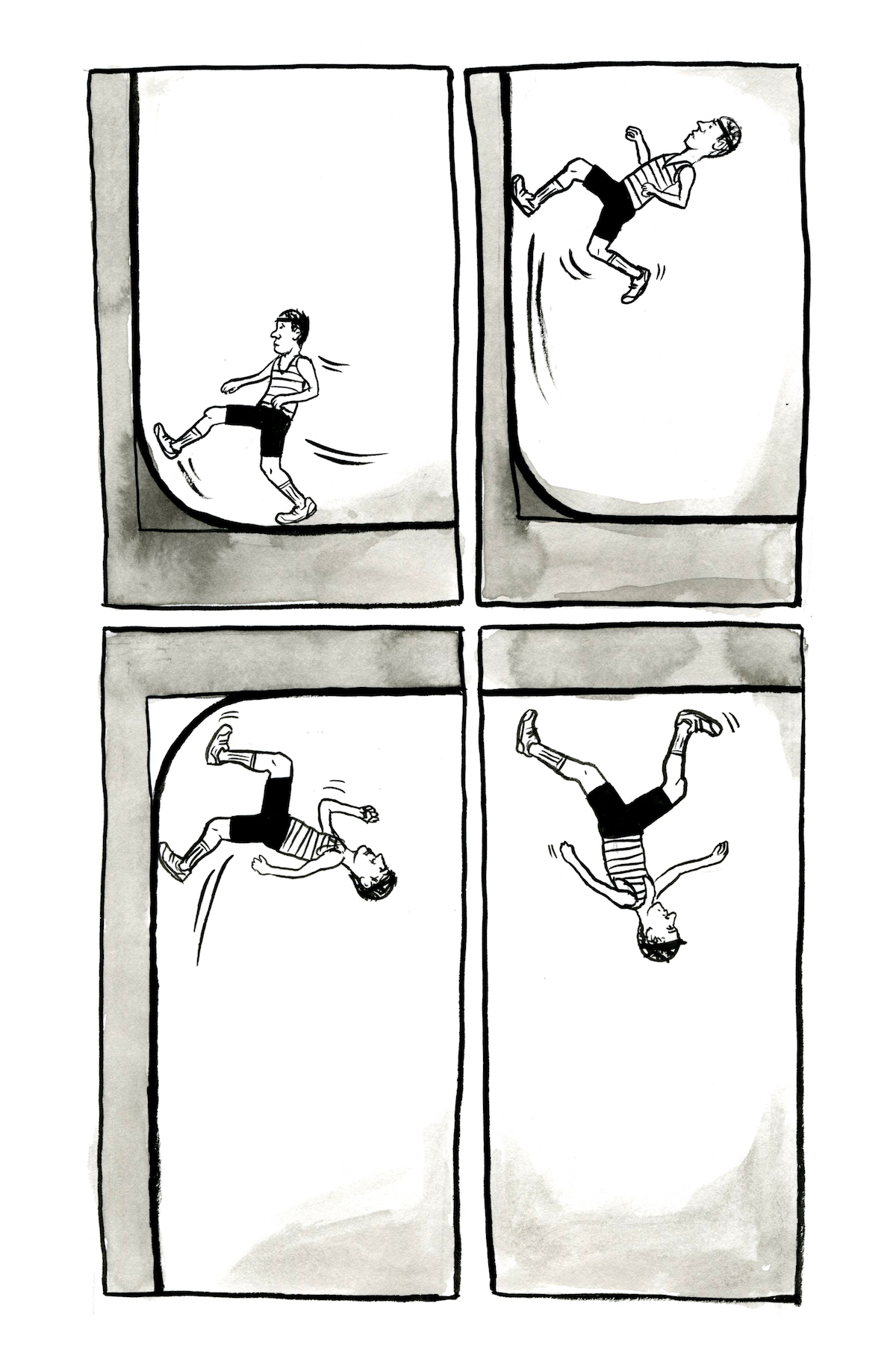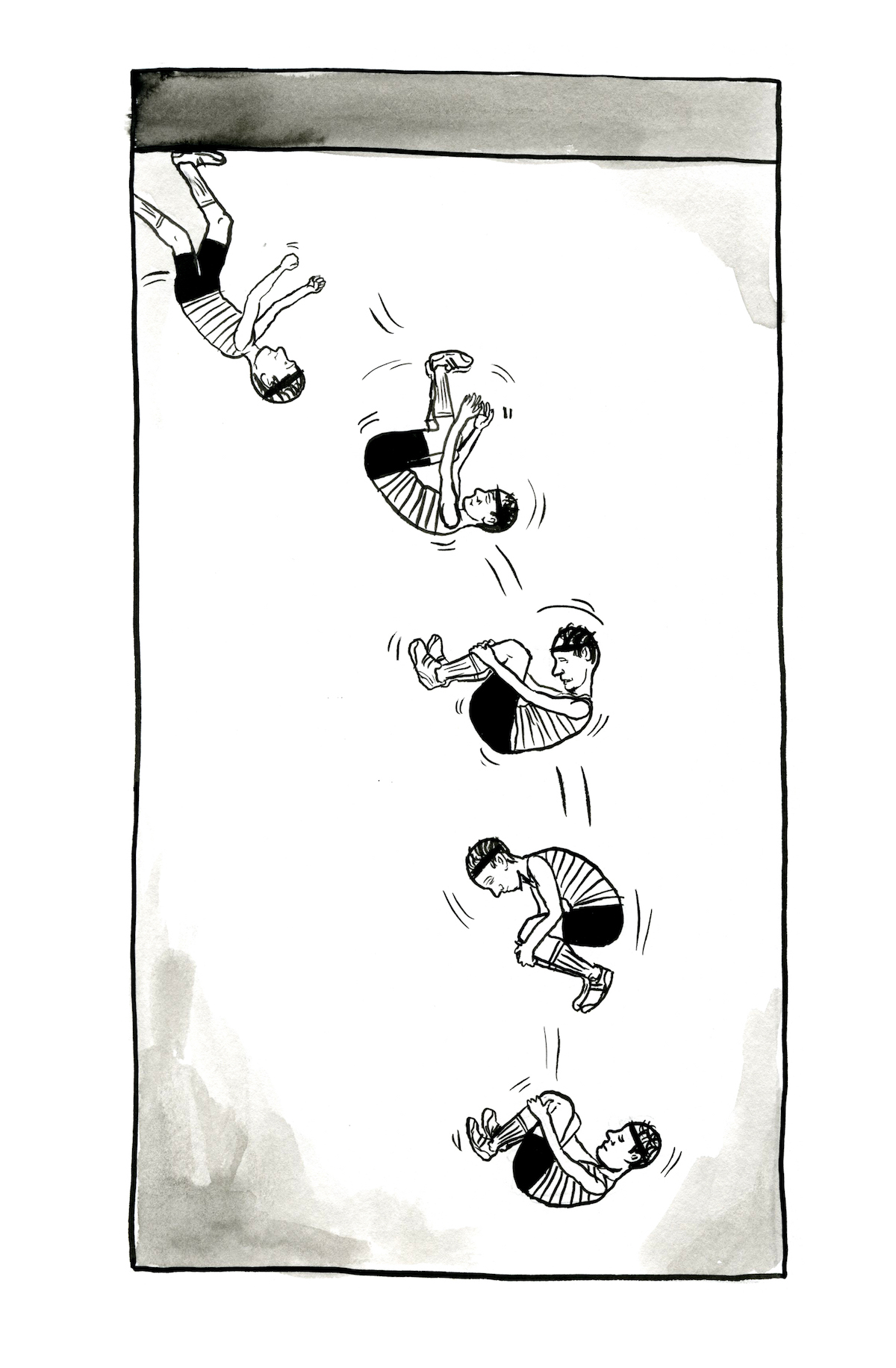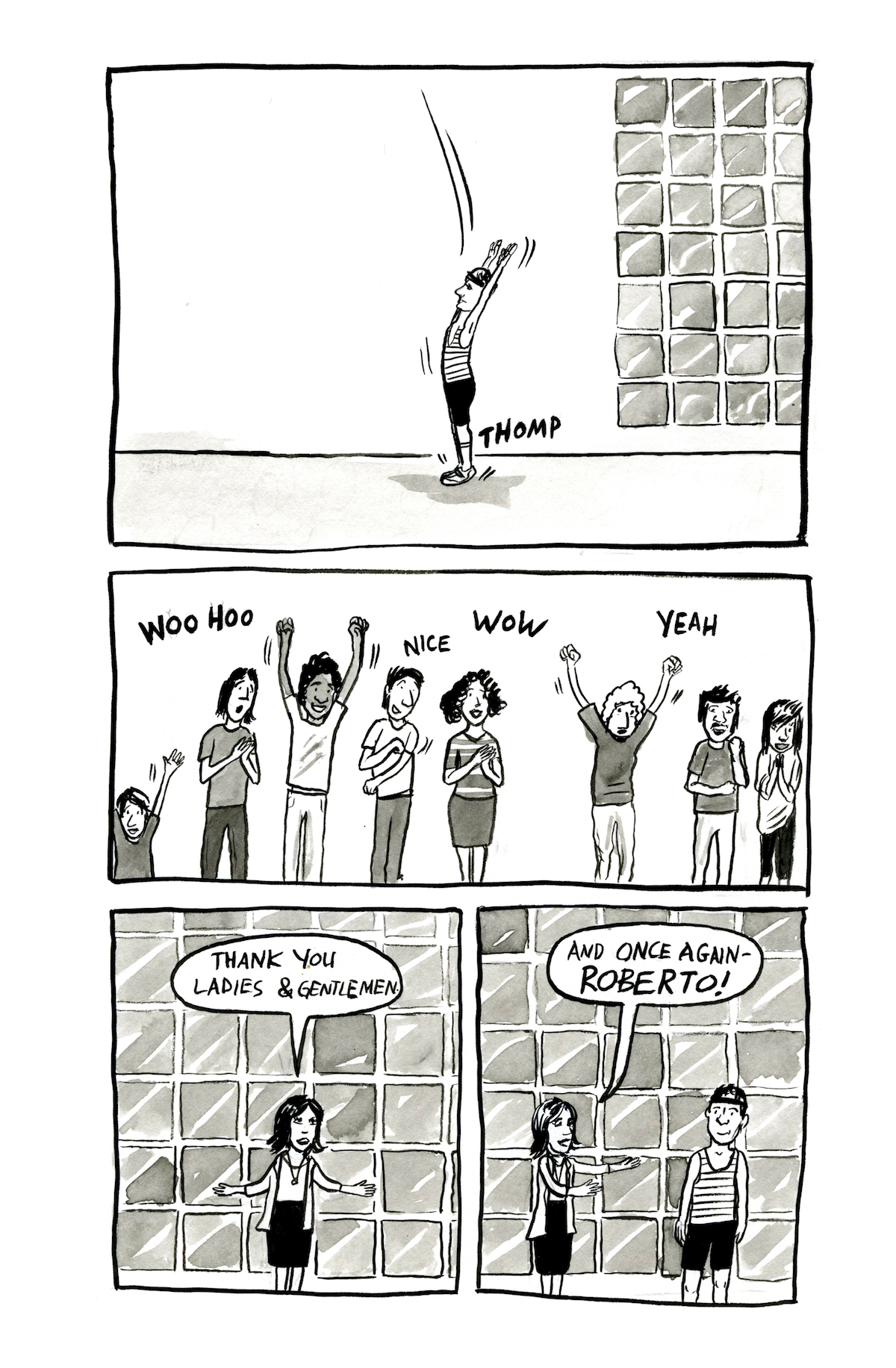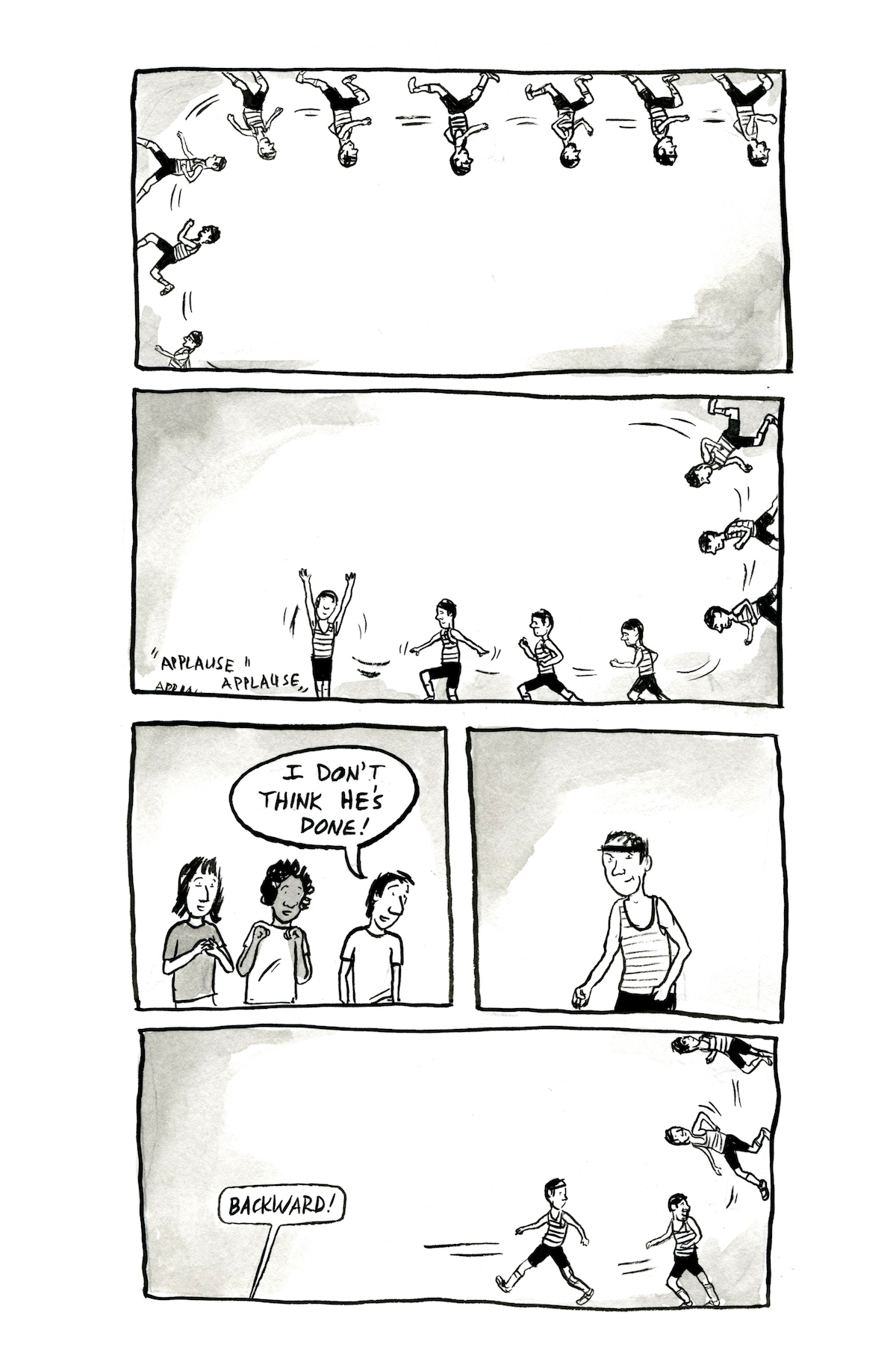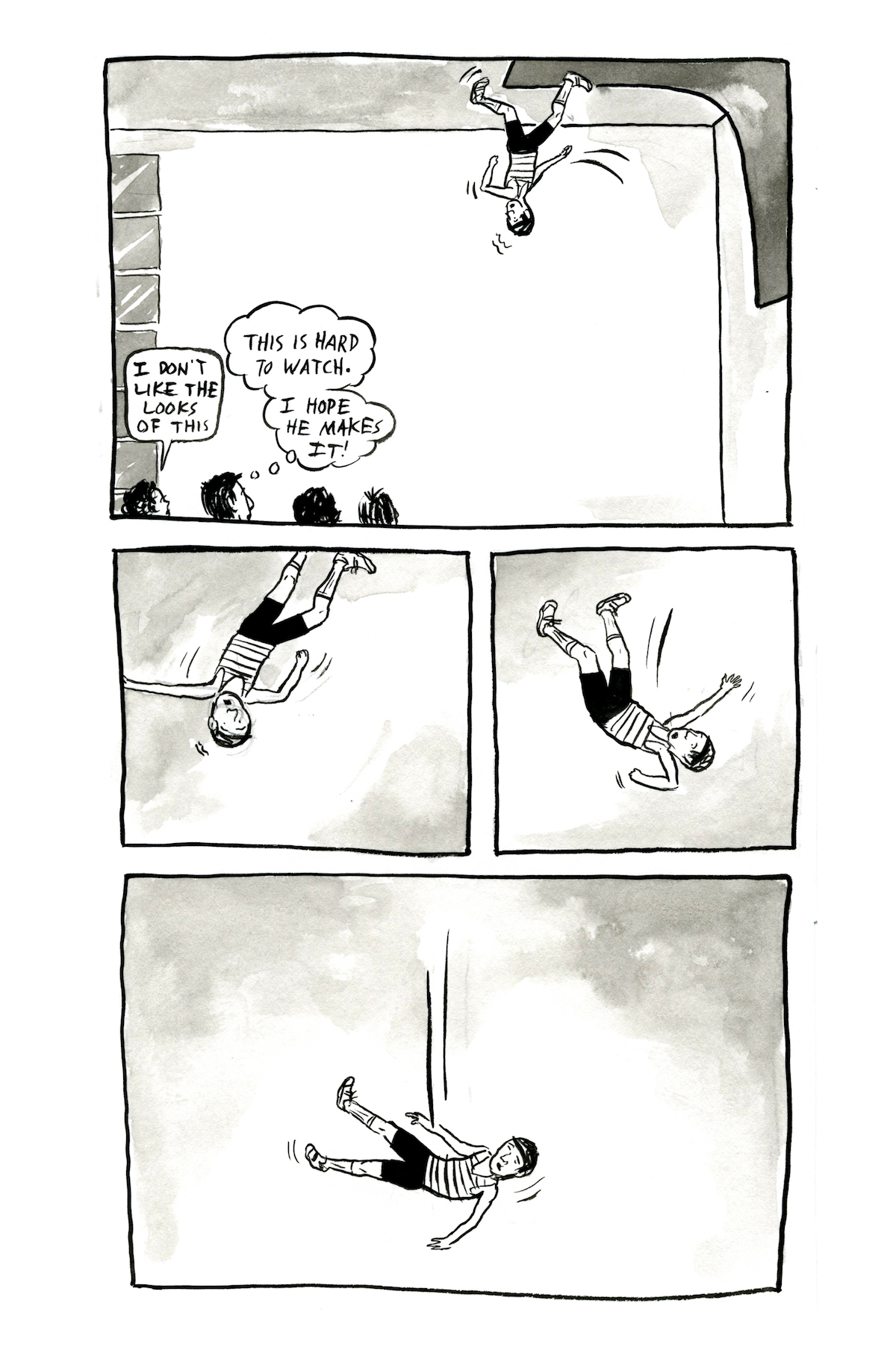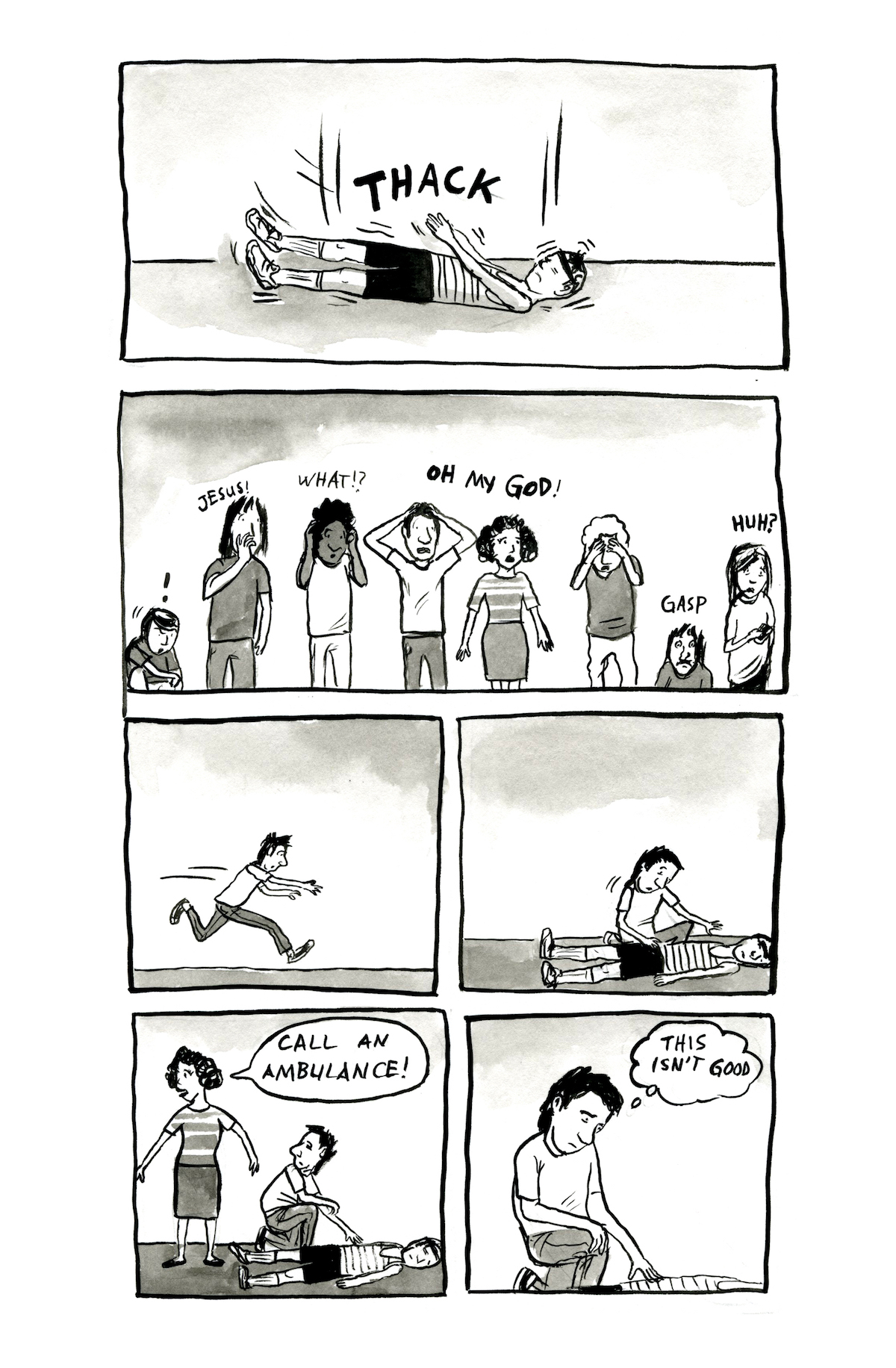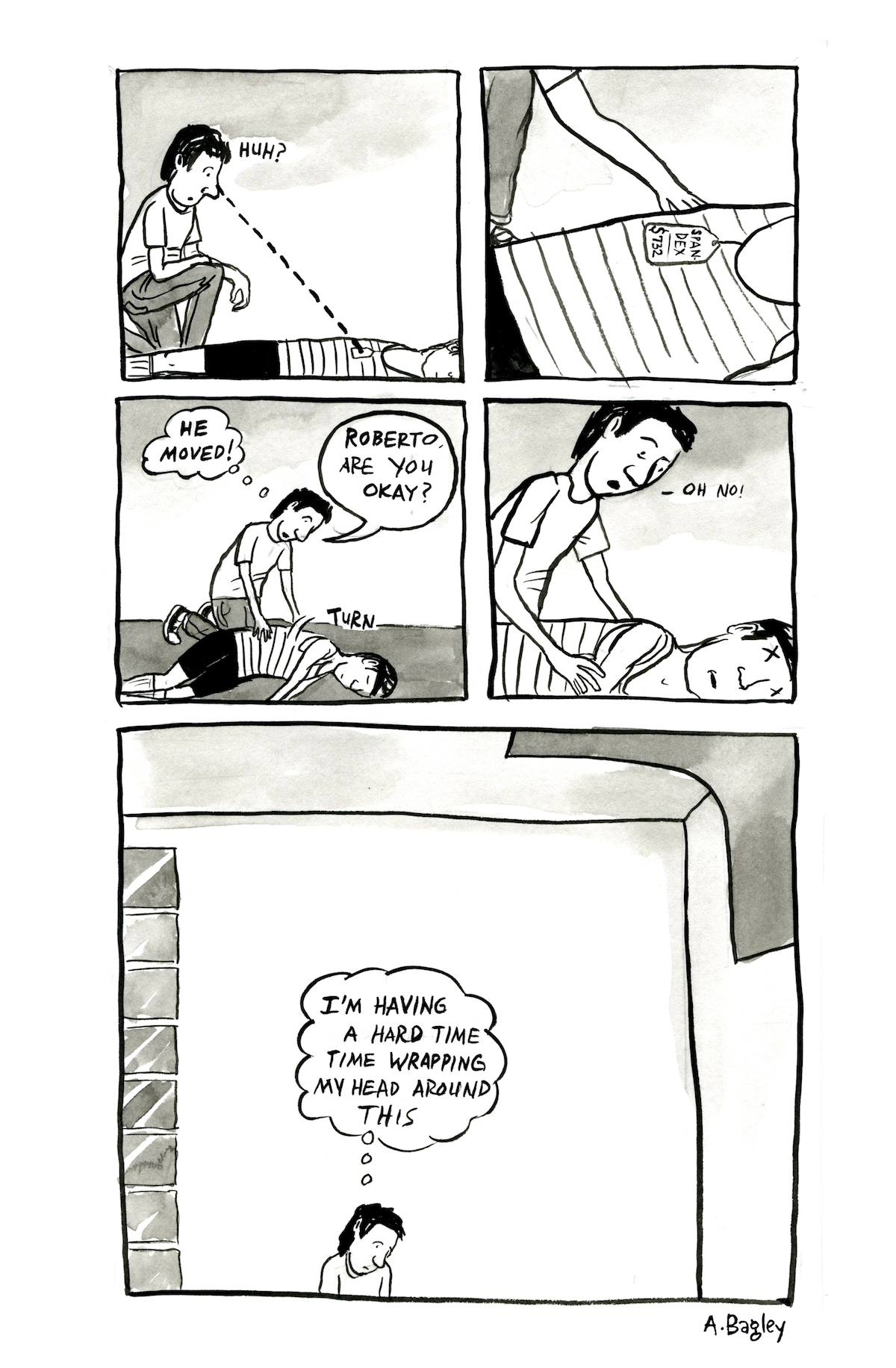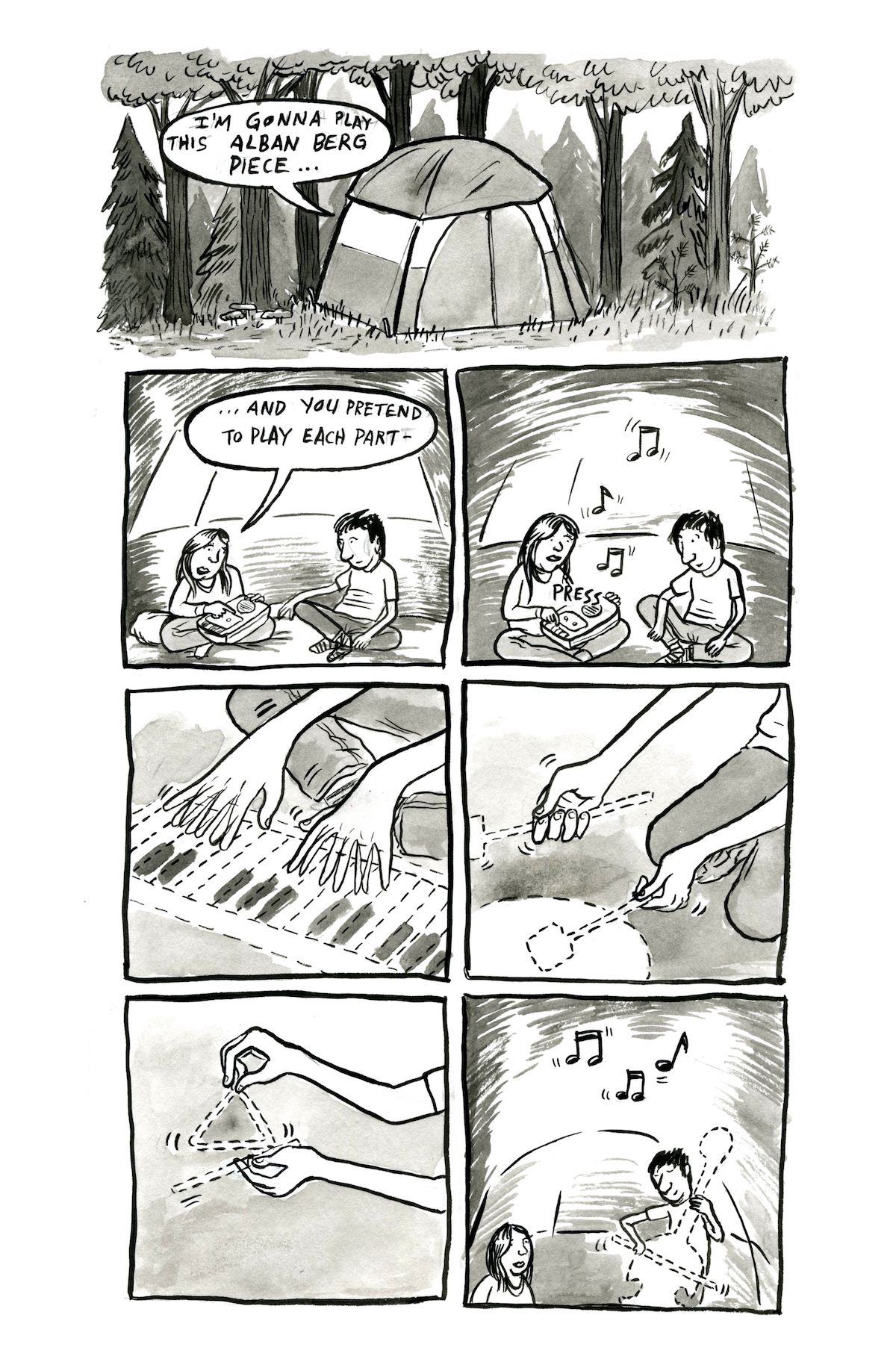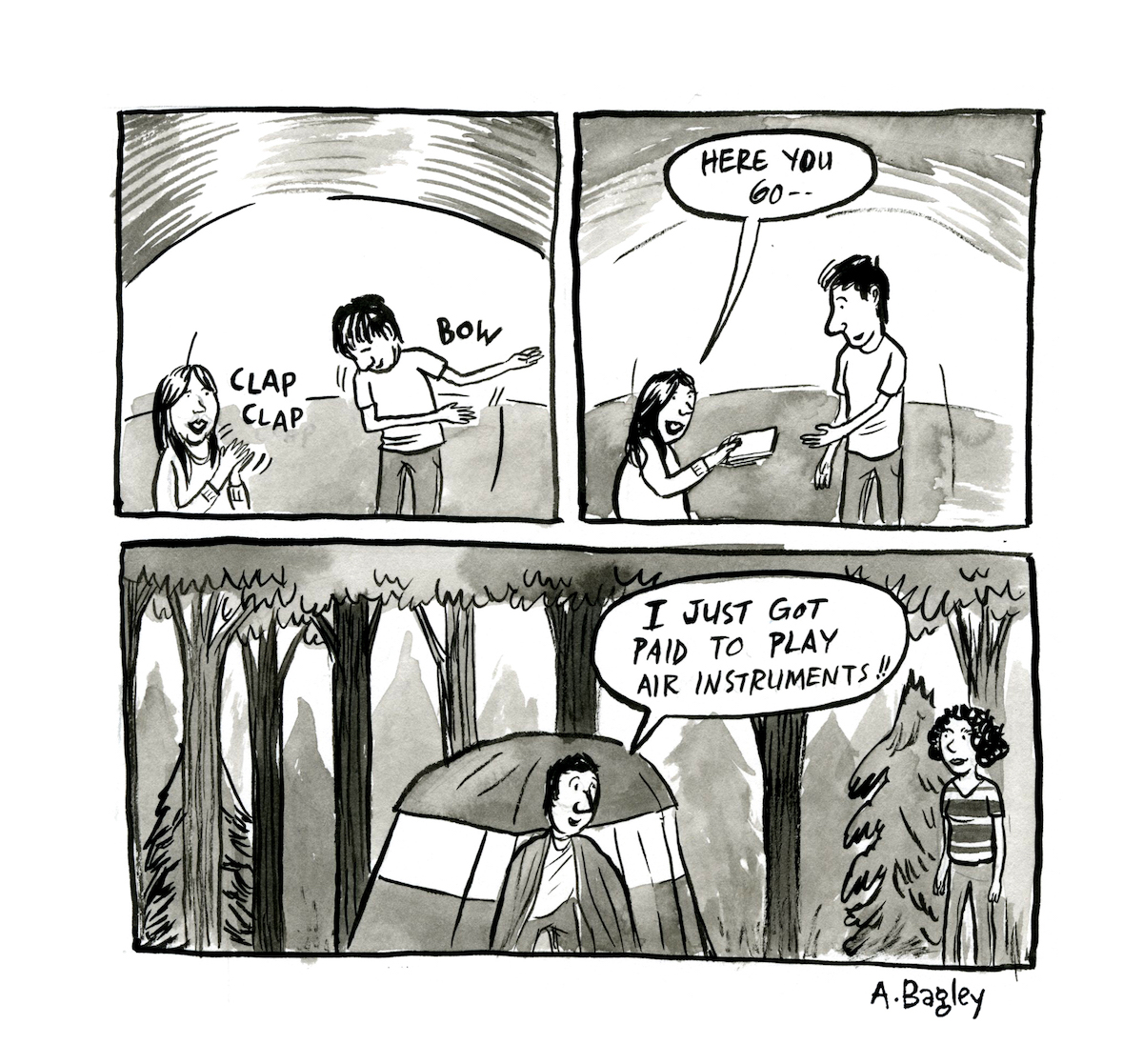Portrait Gallery: Ijeoma Oluo
Each week, Christine Larsen creates a new portrait of an author or event for us. Have any favorites you’d love to see immortalized? Let us know
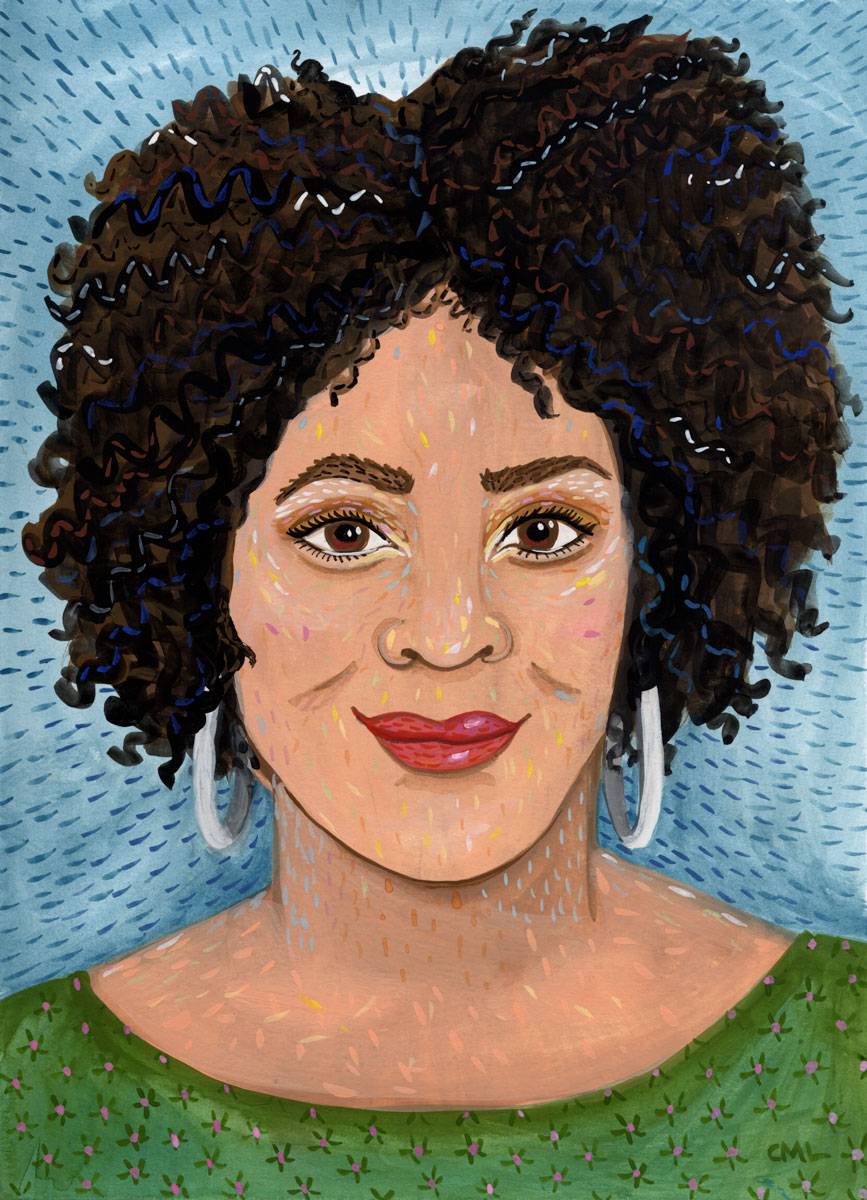
Friday, May 11: Hugo Literary Series
An amazing array of writers - Portland novelist Lidia Yuknavitch, poet Tarfia Faizullah, and the indefatigable Ijeoma Oluo - present new work, along with singer-songwriter Nick Droz, on the theme "There Goes the Neighborhood."
Northwest Film Forum, 1515 12th Ave, http://hugohouse.org, 7 pm, $25.
Future Alternative Past: The word we want is "inclusive"
Every month, Nisi Shawl presents us with news and updates from her perch overlooking the world of science-fiction, fantasy, and horror. You can also look through the archives of the column.
One of us
I hate “diversity.” Diversity is a white person word. A male, cis, het, able-bodied word. A word that presumes its own characteristics are the world’s default settings even as it seeks to leaven them with “otherness.” That arrogant lack of awareness is why I prefer to talk about inclusiveness in SFFH. Inclusiveness means including in what you’re doing those whose traits differ from the dominant paradigm, not just sprinkling them on top. Inclusiveness allows for the possibility that those included have some say in the matter of where and when they’re included, and how, and whether they’ll want to reciprocate. It de-centers and de-privileges the unmarked state.
Thank you. I’ll be here all week.
Climbing down off my hobbyhorse, now, and removing the rhetorical gear that helps me ride it, I’ll mention a couple of surveys showing how inclusive SFFH publishing isn’t. In 2016, Fireside Fiction published a special issue on the presence of black writers in the field. Strange Horizons conducted its own annual investigations of the numbers of the genre’s women reviewers and reviewees from 2011 through 2015, modeled on those of non-genre magazine Vida.
What Fireside and Strange Horizon found was extraordinarily depressing: women and blacks were represented even more poorly in SFFH publications than in the sadly lacking mainstream venues Vida examined. And yet I have seen an improvement in that representation in my lifetime. And I hope to see more.
For many years I’d approach any visibly black person attending a convention where I found myself. “Hey, look!” I would say, rudely pointing. “Another one!” Then I’d introduce myself. Easy enough to be this forward when only a dozen of us attended any fannish gathering. But a few years back I went to a con with over a hundred People of Color present, among them a couple score of African descent. The face of fandom had quite literally changed.
The prime mover behind this change is Con or Bust, a nonprofit providing hassle-free grants to People of Color wishing to attend SFFH cons.
Originally Con or Bust operated under the umbrella of the Carl Brandon Society, a nonprofit I helped found in 1999. The CBS administers a scholarship fund in Octavia E. Butler’s name and also gives out $1000 literary awards. Another band of social justice warriors, the James Tiptree, Jr. Literary Council, presents awards to SFFH that “explores and expands our understanding of gender” and two annual fellowships supporting gender-exploration-focused projects-in-progress.
So CBS members and the Tiptree “motherboard” and similarly-minded groups have hunkered down to make inclusiveness on myriad axes of difference the done thing. And the results are evident. And also, as predicted by polymath Samuel R. Delany in his groundbreaking essay “Racism and Science Fiction,” with growing influence and increased economic rewards for the formerly marginalized have come savage attacks by those to whom the loss of unearned privilege equals oppression.
Lately, though, there’s been an upwelling of still more inclusive-mindedness among SFFH’s gatekeepers: publishers, editors, award juries, agents, critics, and so on. Because the box office success of Black Panther proves, stunningly and conclusively, that there is an audience for stories of the vast majority of us, those who don’t fit the dominant paradigm. A paying audience. A big one.
Usually I link to relevant titles when I write these Futuristic Alternate Past raves. Not this time. There’s enough material out there that I’m going to encourage you to refer instead to others’ lists: winners and honorees of the Tiptree; nominees for and recipients of the CBS Parallax and Kindred Awards; entries at SF Mistressworks; my own Crash Course in the History of Black SF. I know there are others. I know you’ll find them.
Recent books recently read
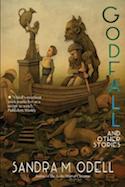
Godfall and Other Stories (Hydra House) collects most of the often-online work of prolific new author Sandra Odell into one print volume. Odell is a flash fiction adept, and Godfall’s shortest stories glitter with the brightness of well-polished lenses, offering sharply focused glimpses of her imagined worlds’ scary beauties. Longer pieces, like the title novella, carry their heftier weight with seeming effortlessness: butchering divine carcasses, rescuing kids from nuke-rigged chains, sipping immortality from their family’s empty wineskins, these characters lift Odell’s improbable situations from the page, from mere words to life. Along with the stories she shares notes on their genesis. Both Odell and editor Cat Rambo mention the author’s clueless use of a racial slur in an earlier draft of “Black Widow,” for which she was ostracized by appalled critique-mates. She’s learned an immense amount about representation from that experience, as these meticulously aware stories show.
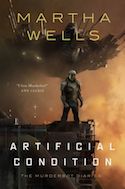
Second of The Murderbot Diaries, Martha Wells’s Artificial Condition (Tor) does a bang-up job of filling in newcomers to the series. The books are a happy blend of crime procedural and far-future hard science fiction. Murderbot, a self-aware security robot investigating its own apparent massacre of innocent civilians, narrates its adventures in an easygoing, casual tone that’s also logically rigorous. Aided by a bored sentient research ship, it infiltrates the onsite records of the mothballed mining operation where it supposedly went berserk. Further explorations are scheduled for the Diaries' last two books, to be released later this year to clamoring fans — among them Kate Elliott, Ann Leckie, and me.
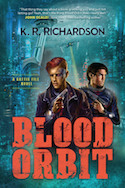
K.R. Richardson is actually local fantasy author Kat Richardson. The new byline appears on the cover of Blood Orbit (Pyr), her vision of the intersection between noir and the black depths of space. On a corporate-owned planet, a rookie cop and a world-weary detective with experimental cybernetic implants team up to solve the mystery behind an apparently pointless mass homicide. There are racial clashes and routine shows of class hostility, but what really got under my skin was the practical nastinesses of Inspector Dillal’s machine grafts. No Neuromancer-esque ease, no automatic jacking-in for Dillal. Postsurgical pain clenches his jaw, the threat of infection pits him against a doctor more concerned with lost time and equipment than his health, and colleagues wince and retch at his disturbingly chimeric appearance. A truly tragic mulatto, and an appropriate hero for this affecting cross-genre tale.
Couple of upcoming cons
ConCarolina came that close to highlighting an unrepentant sexist and homophobe as their Guest of Honor. Wisely, they’ve replaced him with the redoubtable Seanan McGuire, representative of a few non-dominant paradigm traits her own self, and also the author of a zombie novel that made me cry. Go bask in her wit, talent, beauty, and graciousness, forgetting the mistake that was not made.
The Locus Awards Weekend takes place again in Seattle this year. As I wrote in my May 2017 column, a light program of readings and panels supplements Saturday’s big deal awards banquet. New for 2018: three free memberships to People of Color! Do you qualify? Apply via the link at the top of this paragraph and you may witness firsthand that magical moment when emcee Connie Willis bestows a plastic banana upon the wearer of the ugliest and least authentic Hawaiian shirt.
Thursday Comics Hangover: What he's fighting for
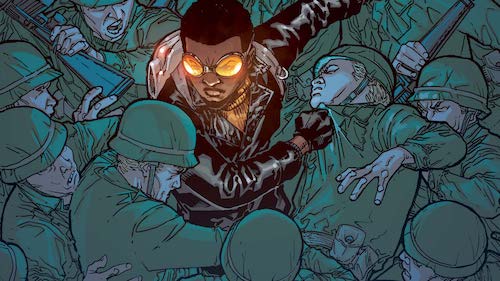
With a very few exceptions, superheroes have always been portrayed as defenders of the status quo. It's a superhero's job, at the end of the story, to return the world to something like the condition they found it in at the beginning of the story. On a very basic level, they're opposed to change and to protest and to evolution.
You can't help but feel bad for Jason Fisher, the jetpack-wielding superhero at the heart of screenwriter John Ridley's comic The American Way: Those Above and Those Below. Fisher is doing his best to save lives and serve the law. But as a Black man, Fisher is held to standards that white superheroes like Batman avoid. When Fisher catches an armed Baltimore radical in the first pages of the book, the Black residents of the neighborhood immediately label him a "sellout."
It only gets worse from there. Someone else calls Fisher "a traitor" and "a tool of the money class." And when a Black man calls him an "Uncle Tom," Fisher snaps back: "Read the book. He died protecting people. What the hell did you ever do?" Set in the 1970s, Those Above and Those Below is a deeply political story about revolutionaries and burnouts and everyone else who falls in between.
As you might expect from the writer of 12 Years a Slave, Ridley's script is taut and nuanced: you won't find a bunch of obnoxious 1970s references added in for unnecessary atmosphere. It's very obvious that America is being torn apart in this book, but Fisher doesn't have to yammer on about the Nixon Administration's excesses to convey the paranoia or the claustrophobia of the time. The art, by Georges Jeanty, is dense and detailed. I'd like to see a little more attention to facial expressions and physical differences between characters, but the action is clear and the storytelling is impeccable.
If you enjoy a good superhero story that doesn't shy away from the weird politics of the genre, you'll very likely enjoy Those Above and Those Below. But it's not the cynical, Frank Miller-style deconstruction of the genre you've come to expect from "adult" superhero stories, either. At the heart of the story, Fisher's decency shines through: he's someone who wants to help, and who doesn't shy away from the question of whether his help is wanted — or even needed. More superheroes should ask themselves that same question.
This Saturday, visit the grand opening of Estelita's Library
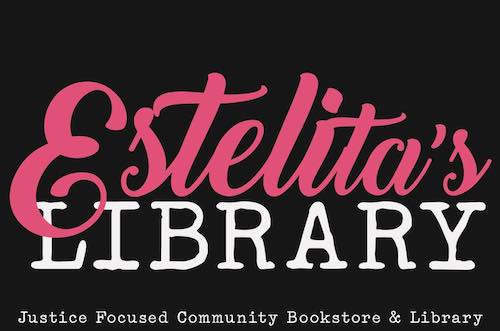
This Saturday from noon to 4:30, come to Beacon Hill — right near the Link light rail station — to celebrate the grand opening of Estelita's Library, a "Justice-Focused Community Bookstore & Library." From the Facebook page:
Estelita’s Library will be a curated community bookstore and Library with books focused on social justice, ethnic studies, and liberation movements.
The goal of Estelita’s Library is to have community book talks, classes, meetings, history lessons, and much more to strengthen and develop our collective analysis for justice.
Our model is to move away from ownership of books and a community library model. Estelita’s Library is open to everyone and will have a membership model to borrow books. Yearly Memberships will be available on a sliding scale and will grant discounts to food and events.
The grand opening party will feature music from DJ Vitamin D, food, wine, and a patio. As everyone knows, books and community go hand-in-hand; it's great to see South Seattle getting another venue to gather and talk about topics that matter. Go give Estelita's some love.
It's time to #GiveBIG
As I mentioned this morning, today is GiveBIG, the Seattle Foundation's annual nonprofit fundraising drive. Before I provide a list of all the literary nonprofits that are participating in this year's GiveBIG, I wanted to highlight a few transitioning organizations that especially need your help this year.
As I mentioned, Books to Prisoners is in need of a new home, and any support you could offer them would be a great help.
Hugo House, of course, is finishing up a big drive to open up the newly refreshed Capitol Hill home for the organization. This has been a tough few years for the House, and their long nomadic period is finally coming to an end. Help nudge them over the finish line?
Town Hall Seattle is in the middle of an Inside Out program of events happening all around town while their grand old hall is being renovated for a few more decades of readings and arts programming.
And Folio: A Seattle Atheneum is undergoing a move of its own: the organization will soon be in the Pike Place Market. They could use your support while they move into their new home.
And here are all the other local literary organizations who are hoping for your support today, in alphabetical order.
ArtistTrust, which supports amazing local writers like E. Lily Yu.
The fabulous Clarion West, which serves as an entry point to, and a beating heart for, Seattle's thriving science fiction community.
Jack Straw Foundation, which helps writers find confidence in their own voices.
Pongo Publishing, which teaches at-risk kids how to communicate through poetry.
Push/Pull, the Ballard storefront that provides a showcase for independent cartoonists and artists from all over the region.
Short Run Seattle, which is, to my mind, far and away the best convention in Seattle.
Can you help Books to Prisoners find a new home?
Since 2008, Seattle nonprofit Books to Prisoners has been based out of the University Christian Church in the U District. "It's a nice space," Books to Prisoners vice president Andy Chan tells me. "It's about 900 square feet when you include our storage." From those cozy offices, Books to Prisoners has shipped thousands of books to prisons around Washington state and the rest of the country.
But now, Chan says, things are about to change. "Basically, like a lot of churches," he says, University Christian Church is "suffering from a decrease in congregation size, so they're making the hard decision to congregate with another church." That means the space the church provided for Books to Prisoners and other social service organizations is disappearing. Books to Prisoners has to find a new location in the next three months.
So now, Chan says, they need your help. If you know of any affordable office space for a great literary nonprofit, please let Books to Prisoners know. "What we're looking for is ideally 800 square feet," Chan explains. He's been with the organization since 1994, and "we've crammed into 600 square feet before," but "people are falling over each other and it's quite intimate." Additionally, a space that size "decreases the amount of storage you have," which means the organization's access to books is limited.
"We'd like a space that is somewhere close to transit because a lot of volunteers are on transit of some sort," Chan says. "Parking, so we can load and unload, would be helpful," along with a ramp or elevator if it's not on the first floor because Books to Prisoners is always "moving a lot of cartons of books," and if stairs are involved "people's backs are always going out."
"And an incredibly cheap rent would be helpful," Chan says. "Our expenses are about $50,000 per year," with only one paid part-time staffer. Books to Prisoners, he says, spends "$30,000 on postage" annually. A high rent would limit the books the organization could send out and "would be really difficult for us to manage." (You can find a full description of Books to Prisoners's office needs on their blog.)
Of course, if you don't have a lead on a new office, you can still help Books to Prisoners. You could donate your time as a volunteer, or you could support the organization financially. Today is Give Big, the Seattle Foundation's annual donation drive for local nonprofits, and Books to Prisoners is a part of the program.
Over the last few months, prisons have been in the news for adopting policies barring organizations from delivering books to inmates. In New York state, Governor Andrew Cuomo reversed one such policy after a massive public outcry.
Is Books to Prisoners encountering more of these kinds of anti-book policies? "Here's the thing," Chan says: "We deal with these kind of problems constantly. They come up in the news sometimes, but it's something we face every year because we ship to all 50 states. Just last week, the feds backed down from a sweeping change" that would have made it harder to ship books to inmates.
Washington state's prisons have vacillated between more and less permissive book-shipping policies. Penitentiaries in Walla Walla and Connell have occasionally banned used books. What could be the reason behind a used-book ban? Chan suggests that prisons run by private companies have a vested interest in making sure inmates buy new books from the commissary.
Clearly, there's more need than ever for Books for Prisoners. "Books help prisoners to be better people," Chan says. His message for Seattle Review of Books readers: "if they have interest in literacy, in books, in allowing people to learn and better themselves while they're in prison, we're a great charity to give to. We spend almost nothing on overhead."
"It's a constant fight to make sure people have access to something incredibly basic," Chan says. He believes completely in the mission: "please, somebody find me an argument for why it would be a terrible idea to give books to prisoners," he says. "I'd love to hear it."
Book News Roundup: New seasons from Seattle Arts & Lectures and Book-It
Last night, Seattle Arts and Lectures announced a large part of their 2018-2019 season, which opens this fall. It's a pretty fantastic collection of big names (Doris Kearns Goodwin, Barbara Kingsolver) and hot contemporary authors (Tayari Jones, author of the Oprah-approved An American Marriage) and up-and-coming authors (Valeria Luiselli). They'll also host a special series to investigate and celebrate journalism, with guests including Van Jones and newspapermen Dean Baquet and Marty Baron. Upcoming poets include Alice Walker (!!) and Solmaz Sharif and Ilya Kaminsky. Read more and order tickets through SAL's website.
Book-It Repertory Theatre's 2018-2019 season has also been announced, and upcoming plays include Jane Eyre, My Ántonia, and American Junkie. Read more on Book-It's site.
As you likely have seen by now, Amazon is holding the city's economy hostage in order to protest the City Council's proposed head tax on big business. The tax, which would only be levied on the largest companies in Seattle, would likely cost Amazon 20 to 25 million dollars a year. Jeff Bezos reportedly makes 25 million dollars every two hours. Over at the South Seattle Emerald, an editor's note suggests that the city should call Amazon's bluff. I agree. Amazon has inspired a large share of this city's growing pains; it's time they pay for the solutions to the problems they've caused.
Here's a good interview with Seattle author Charles Johnson, whose new book of short stories, Night Hawks, is out this month.
Seattle Pacific University is hosting an all-day publishing bootcamp this Saturday. More information here.
There are scholarships available for a June class about writing inclusive fiction taught by K. Tempest Bradford and Seattle Review of Books columnist Nisi Shawl. Get on that.
Yeah, now everyone is on the "save Barnes & Noble" train. I agree that it would be calamitous for this country if Barnes & Noble went out of business, but I'm not sure anything can be done to save the chain now. They seem to be swallowing their own tail; I've seen too many bookstores start this death spiral to be too hopeful for the future of Barnes & Noble.
Unseen and loved
Published May 08, 2018, at 9:55am
The Pervert, a new graphic memoir by Remy Boydell and Michelle Perez, talks about what it's like to be a trans sex worker in the parts of Seattle that never make it to the movies.
Profiled
— for LaMonte
An ear bud without music
expertly hangs from his collar like a safety line
for closing down the world.
This body, he works so hard to make invisible —
this body, he cannot make invincible —
walks into College English, his head held
towards the floor. Seventeen. He picks the space apartfrom classmates. He’s a window, he’s a door —
his golden eye telescopes, examines the air above —
a third eye with visions he will one day learn
to steer: pathway to a Shakespearean atmosphere.
He argues with himself, his professor, in the arc
of a world not yet understood.
He writes 100 sonnets but shows no one.
Catch up with Kelly Davio and It's Just Nerves
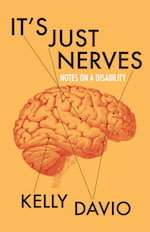
If you've been keeping up with Kelly Davio, founding editor of the Tahoma Review and one-time Seattleite, you've seen her sharp, funny, honest essays in places like Roxane Gay's pop-up magazine, Unruly Bodies. We haven't lured this exceptionally talented writer back to town yet, but she's here this week in spirit to sponsor the site and share an excerpt from It's Just Nerves: Notes on a Disability.
Davio is a poet, an essayist, and an editor. She also has myasthenia gravis, a disease she examines in It's Just Nerves without self-pity and with zero patience for society's failure to meet her disability halfway. The range of this collection — from personal reflections on the vulnerability of illness to sharp critiques of everything from Britian's NHS to the 2015 AWP meeting in Seattle — is simply stunning. Read "Strong is the new sexy" for a taste, then pick up the book and keep going.
Sponsors like Kelly Davio make the Seattle Review of Books possible. Did you know you could sponsor us, as well? If you have a book, event, or opportunity you’d like to get in front of our readers, send us a note. We’d be delighted to reserve a spot for you.
Your Week in Readings: The best literary events from May 7th - May 13th
Monday, May 7: The Book Reading
Amaranth Borsuk teaches at University of Washington Bothell, and her latest book is nothing less than a history of the book as an object, an examination of what the book has meant for society, and a consideration of what the book might become. If you're on this site, you care about this book. Elliott Bay Book Company, 1521 10th Ave, 624-6600, http://elliottbaybook.com, 7 pm, free.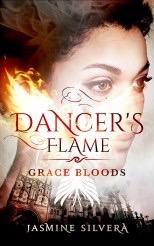
Tuesday, May 8: Offbeat Ada's
This is a conversation about the "fantasies and realities of feminist romance novels." Seattle author Ariel Meadow Stallings, author of The Offbeat Bride, talks with Seattle-area feminist romance author Jasmine Silvera about her new book Dancer's Flame. They'll also discuss diversity in romance, which is a thorny issue. Ada's Technical Books, 425 15th Ave, 322-1058, http://seattletechnicalbooks.com, 6 pm, free.Wednesday, May 9: Castalia
The ongoing UW MFA program reading series continues with readings from students Alex Moni-Sauri and Jordyn Murray. Joining the students are UW MFA alumni Gabrielle Bates and UW professors David Bosworth and Pimone Triplett. As always, I feel duty-bound to point out that "Pimone Triplett" is the best name ever for a poet. Hugo House, 1021 Columbia St., 322-7030, http://hugohouse.org., 7:45 pm, free.Thursday, May 10: Side Life Reading
See our Literary Event of the Week column for more details. University Book Store, 4326 University Way N.E., 634-3400, http://www2.bookstore.washington.edu/, 7 pm, free.Friday, May 11: Hugo Literary Series
An amazing array of writers - Portland novelist Lidia Yuknavitch, poet Tarfia Faizullah, and the indefatigable Ijeoma Oluo - present new work, along with singer-songwriter Nick Droz, on the theme "There Goes the Neighborhood." Northwest Film Forum, $25 Northwest Film Forum, 1515 12th Ave, http://hugohouse.org, 7 pm, $25.
Saturday, May 12: Two Sci-fi Writers
Two Seattle-area sci-fi writers team up to present one humdinger of a reading. Kat Richardson is debuting a new series under the sneaky pseudonym "K.R. Richardson." Blood Orbit is the first in a series of sci-fi police procedural novels. What will forensics be like in the future? Richardson will be in conversation with Rhiannon Held, who is the author of the Silver series of urban fantasy novels, which just concluded with the release of Death-Touched. University Book Store, 4326 University Way N.E., 634-3400, http://www2.bookstore.washington.edu/, 6 pm, free.Sunday, May 13: Ramayana: An Illustrated Retelling Reading
Elliott Bay Book Company reading coordinator Rick Simonson regularly attends a huge book festival in India, and his knowledge of works in translation is nigh-encyclopedaic. This afternoon, Elliott Bay welcomes someone who falls into both those areas of interest: Arshia Sattar is a world-class translator, and she's translated some of the finest Indian classics of literature into English. For this trip, she's reading from her latest book, which is an adaptation of a classic further adapted for children.Elliott Bay Book Company, 1521 10th Ave, 624-6600, http://elliottbaybook.com, 3 pm, free.
Literary Event of the Week: Side Life reading at University Book Store
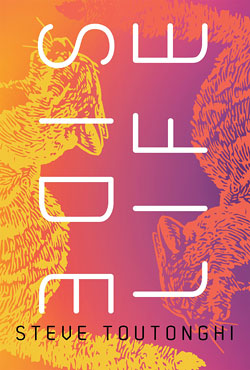
"The story has a note of urgency, but it is also set in a very familiar context," Author Steve Toutonghi told me last year about his then-upcoming novel Side Life. He was unveiling the cover of the book, and we had a great conversation about all the work that modern book covers have to do - they have to be attractive and unique in a display, on a shelf, and as postage-stamp sized images on websites.
"I'm sort of at the edge of my seat to see what this [cover] will look like in the context of a table at a store," Toutonghi said at the time. This week, he finally gets to see: Side Life is finally in bookstores everywhere tomorrow. And this Thursday, Toutonghi debuts the book in a reading at University Book Store.
Side Life certainly lives up to Toutonghi's brief description from last year: It's familiar to any Seattleite. The book takes place in and around Seattle - our freeways, our hills - and the characters in it live on the fringes of our tech-drunk culture. Vin is a wannabe tech star who has been booted from his own company. Dejected, he winds up a housesitter at a Queen Anne mansion.
And the story is urgent from the very beginning. The house in Side Life is haunted, but not by ghosts. Instead, it's haunted by technology: smooth coffins that look like a consumer tech product, notebooks full of computer code, and creeping sense that reality might not be real.
Side Life has been a long time in the making, but it couldn't feel any more relevant. In a time when seemingly everyone is welcoming always-on speakers into their homes and Seattle teeters on the edge of some ugly revelations about the state of the tech economy, this book plays up those anxieties and centers them in one very familiar, very urgent story.
University Book Store, 4326 University Way N.E., 634-3400, http://www2.bookstore.washington.edu/, 7 pm, free.
The Sunday Post for May 6, 2018
Each week, the Sunday Post highlights a few articles we enjoyed this week, good for consumption over a cup of coffee (or tea, if that’s your pleasure). Settle in for a while; we saved you a seat. You can also look through the archives.
I tried to warn you about Junot Díaz
Regrettably, I highlighted Junot Díaz’s New Yorker article about his childhood rape here a couple of weeks ago. This week, I’d like to give equal space (and wish I could give more) to the writers who have spoken out about their experiences of harassment and misogynistic treatment by Díaz — Zinzi Clemmons, Carmen Maria Machado, and Monica Byrne among them.
Why do I regret sharing Díaz’s piece? Not just because I gave air space to a man who used his power badly, but because I helped disseminate a story that will be used, is already being used, to create understanding and empathy for his appalling behavior toward women. In that New Yorker piece, Díaz claimed his personal story as one of the wounded; in marketing terms, he controlled his narrative. But let’s be clear: No amount of trouble justifies, excuses, or ameliorates doing harm to others.
On her personal blog, essayist, novelist, and producer Alisa Valdes tells her own Díaz story, which is also a story about how the writing of women, and of women of color, is read — and especially about how the literary establishment grants prestige and power. What it highlights is the full extent to which belief takes the side of the powerful. And the full extent of the damage that does.
Things were hard. Harder than they should have been. People posted about how "crazy" I was. Truly vile and abusive shit. I had become a writer in part because I am an introvert. I never wanted the attention to be on me as a person, only on my writing. But there I was, being dragged through the mud. I was named one of the 25 Most Influential Hispanics in America by Time magazine because of my books, but still could never get a call back from the New Yorker, or the NY Times, when I pitched poems or stories or op-eds. Maybe it was Diaz. Or maybe it was something else. My vagina. My book covers. My lack of an MFA. My honesty. My unwillingness to write in a way that made white liberals feel sorry for me while admiring me.
Treated Like Trash
Kiera Feldman reports the story of a young immigrant who died working what might be one of the hardest and most dangerous jobs in the country: collecting garbage in New York City. After Mouctar Diallo was killed by the truck on which he served as a “third man” — an under-the-table addition to the standard crew — the driver denied knowing Diallo to avoid blame for the death. A heartbreaking and fury-inducing installment in ProPublica’s ongoing coverage of corruption in New York’s garbage industry.
The truth of Mouctar Diallo’s death is that the authorities investigating the accident did not learn that he was a worker on the truck for at least two months, and that when they did, they took no action against the driver and helper who had lied to police. The Business Integrity Commission, the New York City agency charged with oversight of the commercial garbage industry, allowed both the driver and main helper to keep working. The police and Bronx prosecutors closed their investigation with no criminal charges.
E-Books, Accessibility, Luddites, and the Techno-Dazzled
I still remember the first time a doctor handed me a tissue, to catch the tears he predicted (wrongly), before telling me what he saw in the back of my eyes. As my sight has degraded less-than-gracefully over the years, my brain compensates. I know what f—k means. I know what “I —ve y—” means. If I can’t see recto and verso together, I can see each in turn. And although my eyes are slowly unlearning how to read — at least, to read as they have for most of my life — there are now so many other ways to read, and write, than on a printed page.
So I appreciate M. Leona Godin’s smart, smart take on attitudes toward e-readers and how that translates when an electronic book is the only kind of book that's accessible. Her new column for Catapult on blindness and writing and reading is more than worth following — great writing “with a badass attitude” (as she describes Jim Knipfel) about how vision impairment affects a life dedicated to words.
This is my point: Blind and print-handicapped readers do not have the luxury of deciding whether they will go old-school and deny the digital age. Braille books and audiobooks have limited publishing potential built-in because of their high production costs, but when it comes to publishing electronically, it’s the attitudes rather than the costs that are limiting.
‘No Company Is So Important Its Existence Justifies Setting Up a Police State’
It was always a coin toss, right? Whether our science fiction future was going to be Transmetropolitan or flying cars?
Actually, let me take a step back. Calling something "science fiction," whether happy or scary, implies it's not real. And it's time to stop thinking about the invasion of our privacy and the decimation of our economies, whether it's by tech giants or simply enabled by them, is the future or a fiction. This is our ordinary now, our daily reality. It's time to start responding like it matters.
Here's a piece by legendary programmer Richard Stallman, someone who knows the industry from the inside out, on the legal and behavioral shifts that need to happen to protect the privacies, political freedoms, and jobs under threat. Great read overall, but if you don’t have time, here’s one thought to walk away with:
Fuck them — there’s no reason we should let them exist if the price is knowing everything about us. Let them disappear. They’re not important — our human rights are important. No company is so important that its existence justifies setting up a police state. And a police state is what we’re heading toward.
Whatcha Reading, Kim Fu?
Every week we ask an interesting figure what they're digging into. Have ideas who we should reach out to? Let it fly: info@seattlereviewofbooks.com. Want to read more? Check out the archives.
Kim Fu is the Seattle-based author of two novels — 2014's For Today I Am a Boy, and most recently, the only-months-old The Lost Girls of Camp Forevermore, which our own Paul Constant called "...the first truly great novel I’ve read in 2018," and he continued the praise with "...and it sets a high bar for every novel I’ll read for the rest of the year" — and 2016's poetry collection How Festive the Ambulance .
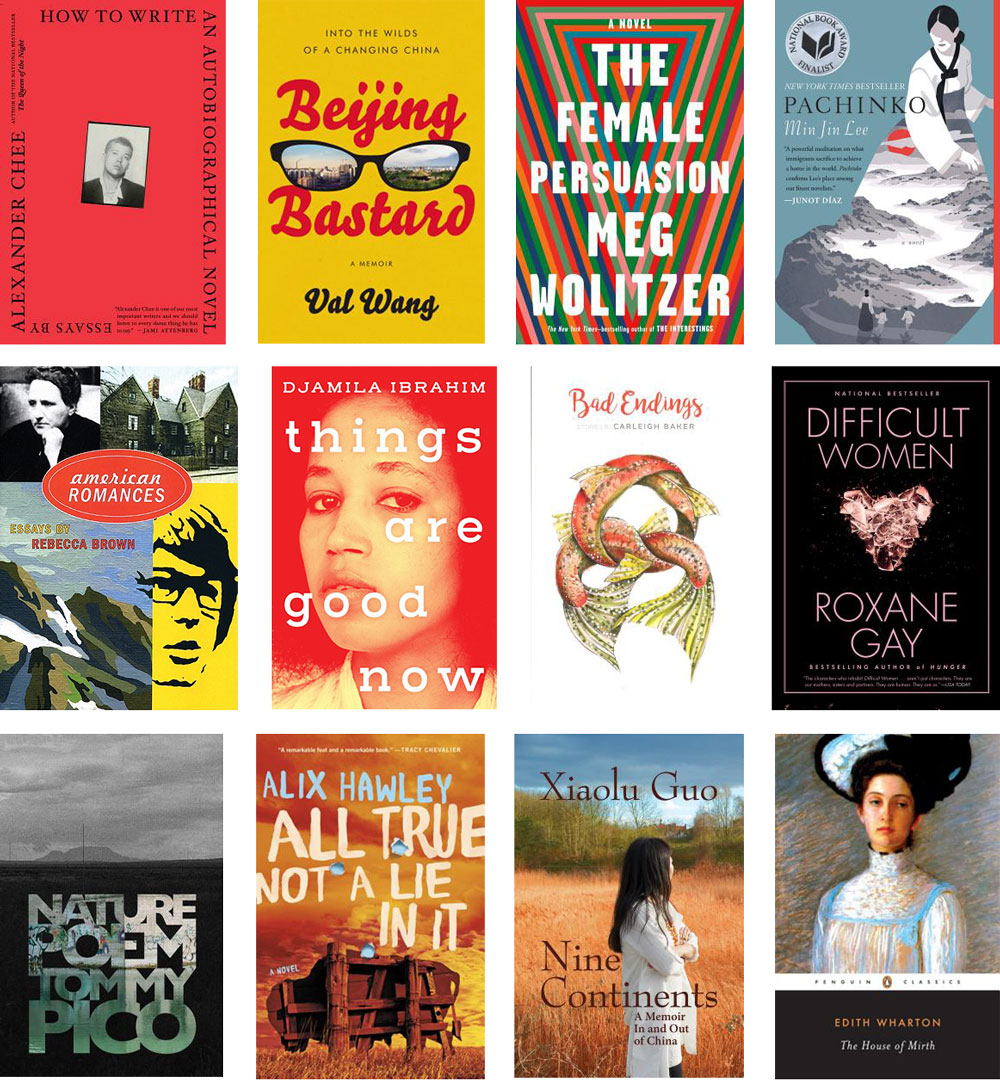
What are you reading now?
How to Write an Autobiographical Novel, a new essay collection by Alexander Chee. I’d previously read a number of the essays when they appeared online and in magazines, but the effect of reading them together is already quite different, because of their cumulative narrative power — the story of a career and a life — and how long you get to stay continuously bathed in Chee’s hypnotic, exquisite voice. I’m also halfway through Val Wang’s memoir Beijing Bastard, a window into Beijing at the end of the twentieth century, a crucial and chaotic moment in its development as a modern city.
What did you read last?
I just finished The Female Persuasion by Meg Wolitzer, a novel that reminds me of Jane Austen in the best sense — an almost sociological examination of a particular cross-section of white womanhood and the quadruple-bind of women’s choices, firm in its viewpoints and sympathies, entertaining and observant. Before that was Pachinko by Min Jin Lee, a multigenerational epic of a Korean family, set primarily in Japan; it made me sharply aware that “history” is living and endless, as much of the present as the past. Of the books I’ve read in the last couple months, my favorite is American Romances by Seattle’s own Rebecca Brown — a formally inventive wonder that defies categorization, a mix of fact and fiction, essayistic and poetic thinking. (Getting a jump on the next question, Brown has a new book coming out this fall.)
What are you reading next?
My TBR pile is always towering and enormous. The ones I can see from my desk: Things are Good Now by Djamila Ibrahim, Bad Endings by Carleigh Baker, Difficult Women by Roxane Gay (stories), Nature Poem by Tommy Pico (poetry), All True Not a Lie in It by Alix Hawley (novel), Nine Continents by Xiaolu Guo (memoir), and The House of Mirth by Edith Wharton (because it’s almost summer).
April's Post-it note art from Instagram
Over on our Instagram page, we're posting a weekly installation from Clare Johnson's Post-it Note Project, a long running daily project. Here's her wrap-up and statement from April's posts.
April's Theme: Who knows
Combing through years of daily post-it notes choosing what to publish here each month, I find days that have become a mystery, even to me. I don’t know what I was talking about. Sometimes I can investigate these mundane mysteries, unearthing clues in my journal or old day planners. Maybe now that I’ve admitted these particular memory misses, some helpful friend will see and put more pieces together. I know I was having a conversation with my friend — I know which friend — some clever crack involving what chickens dream about — but that’s not exactly it, it was more intricate, there’s something I’m missing — she made me laugh so hard — I said I’d immortalize it in my post-it that night — but now it eludes me. On the calendar, bleak magic falls when I worried my father was dying, and I was in a leg brace after a stupid, spectacular turned ankle that also somehow involved slamming into a parked van. I was trying to catch myself, but seemed to just... bounce off it instead, and fall harder. Life was dark, maybe it was about the little things carrying me through. Or my own improbable mix of small, terrible pieces of unluckiness. The tiffin tin could be recalling the last birthday gift from my ex-wife years before, or maybe it’s when I saw that movie about them and I’m not talking about my life at all. Toenails vs. teeth — who knows. I enjoy its specificity, I’m disappointed I can’t unlock the moment. The last one is too recent, makes me nervous that someone else will know what I meant and I’ll have exposed some awful vulnerability in one of my relationships. But my grandmother with the fingernails and lipstick was long dead by then, and everybody knows how she hurt my feelings.
The Help Desk: Rub-a-dub-dub, should I read in the tub?
Every Friday, Cienna Madrid offers solutions to life’s most vexing literary problems. Do you need a book recommendation to send your worst cousin on her birthday? Is it okay to read erotica on public transit? Cienna can help. Send your questions to advice@seattlereviewofbooks.com.
Dear Cienna,
Reading in the tub: thumbs up or thumbs down?
Sarah, Greenwood
P.S. Please say thumbs down. I hate finding used books with wrinkly spots where wet fingertips once touched the page.
Dear Sarah,
Bathtubs are where I am most productive – where else can you efficiently shed a sandwich bag's worth of skin while also eating spaghetti? And 10 minutes later, it's ready to ferment 30 lbs of cabbage! Bathtubs truly are the altar of the modern American household.
But like you, I draw the line at reading in the tub, mostly because I practice paleo bathing (our CAVEMAN ANCESTORS didn't use HAND TOWELS) and because I once dropped an iPad in the water while leisurely combing sex offender registries and state prison repository sites for people I graduated high school with.
Which isn't to say I don't enjoy a good book while soaking – it's why I signed up as a reading tutor for a girls' at-risk youth program called Miss Demeanors. Now girls are hand-delivered to my home each week to practice their reading skills outside my bathroom door while I eat spaghetti and "shed derm" in peace. For every 10 minutes of reading, they earn one cigarette.
Kisses,
Cienna
Portrait Gallery: LeVar Burton
Each week, Christine Larsen creates a new portrait of an author or event for us. Have any favorites you’d love to see immortalized? Let us know
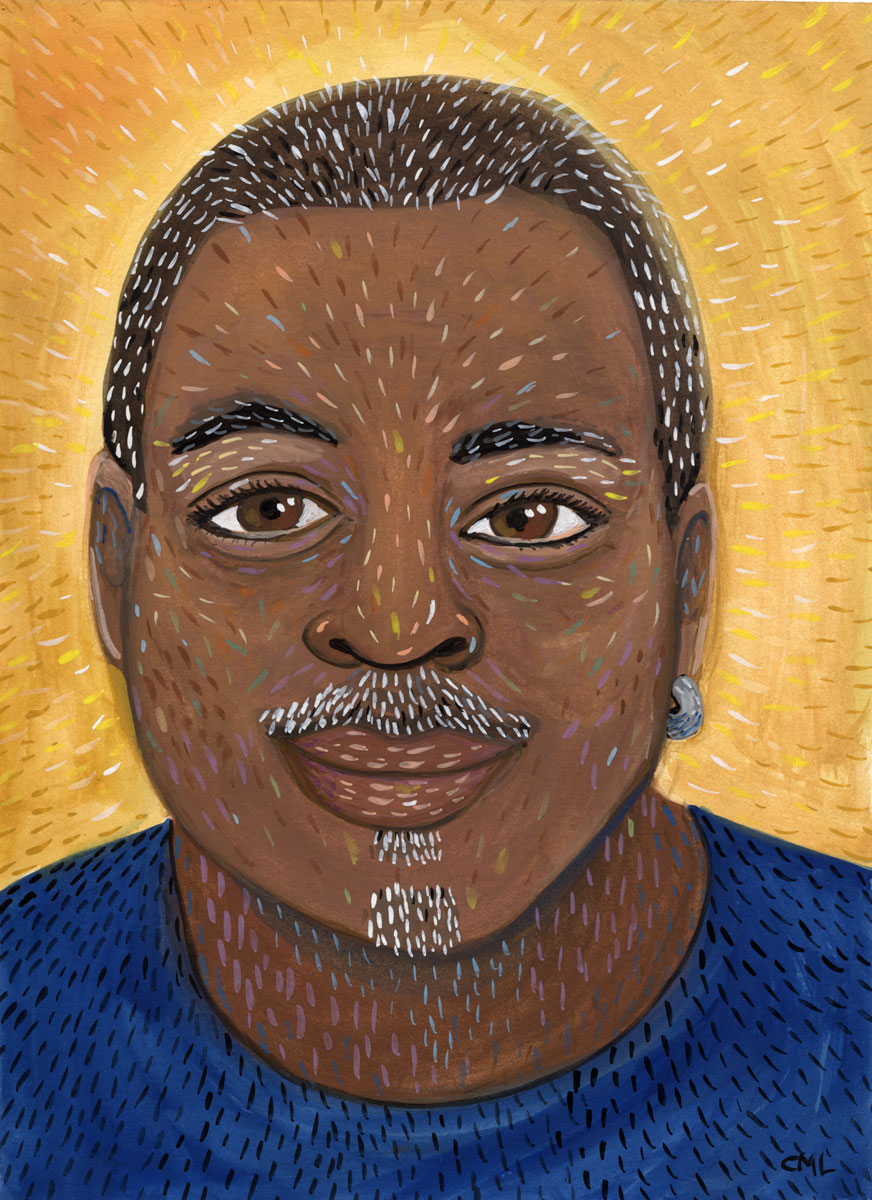
Saturday, May 5: LeVar Burton Reads Live!
How wonderful it is to be read to! If you aren't lucky enough to catch the live reading at the Neptune this weekend, you can always tune into the podcast LeVar Burton Reads!
Kissing Books: Harmony between romance and pop music
Every month, Olivia Waite pulls back the covers, revealing the very best in new, and classic, romance. We're extending a hand to you. Won't you take it? And if you're still not sated, there's always the archives.
Seattle likes to make up for the long, grey winters by exploding as soon as the weather warms. People prise open the pollen-mortared windows of their homes and their cars, and concert series bloom at every waterfront, winery, and from top to bottom over our city’s hills.
Everywhere, music spills out.
A lot of those songs are love songs. And you’ll notice a lot of the same reactions to love songs—especially femme-y, upbeat, feel-good pop songs—that you see critics sling against romance. Predictable. Saccharine. Unreal. Trivial. Pop music is coded feminine the same way rock is coded masculine, and cultural heft is parceled out accordingly. Ryan Adams covers the entirety of Taylor Swift’s 1989 and critics exclaim that his knockoff is more creative and sincere and important than her original. Back in 2012, Carly Rae Jepsen’s “Call Me Maybe” was lighting up the summer and a writer in the LA Weekly with this tautology: “I asked my youngest sister about it. She said it was excellent, which alone proves that it’s not.” That summer I started having flashbacks to the era when Toni Basil’s “Mickey” was everywhere and widely reviled as the World’s Most Annoying Earworm.
You’ll notice how many of these famously annoying songs involve femme-looking people singing frankly about their agency in sex and love and romance. Taylor Swift is notorious for, well, lots of things, but particularly for putting history with her exes into her lyrics—in fact, she wrote a hit song inviting the listener to be one of the future exes she’ll write hit songs about. “Call Me Maybe” is about a girl giving her number to a boy not because he asked, but because she wants to give it to him. And listening to “Mickey” as an adult is mildly unsettling, since the lyrics are definitely about how much the singer wants to bang the title dude and I definitely remember bopping along with that song with all the other ten-year-olds at summer camp.
To this list we could add so many other examples: the Spice Girls, TLC, Hanson, Madonna, Katy Perry, Meghan Trainor, pre-tattoo Justin Bieber, Britney Spears, and Mariah Carey, just to name a few. Hell, even the early Beatles were mocked on account of their primarily female fanbase and girl-group hit covers—until male critics rewrote history after the fact to make them Official Preordained Geniuses of Rock. I haven’t peeked to see if contemporary reviewers slagged on the Supremes, Dusty Springfield, and Martha and the Vandellas, but I wouldn’t be at all surprised to find they had. What Susan Douglas wrote in 1994’s Where the Girls Are is nearly as true today: “Girl group music has been denied its rightful place in history by a host of male music critics who’ve either ignored it or trashed it.” Stop me when this starts to sound like a certain literary genre we all know and love.
The more I look at the parallels between romance and pop songs, the more I feel this particular strain of vitriol is like an immune reaction: it froths up whenever the system — our dude-centric, white-focused, heteronormative system — can’t resolve the tension between a work as an expression of a feeling and a work as a commercial product for sale. How can you create something that evokes a real part of yourself and then turn around and sell it for money? This might explain why this rhetoric of annoyance centers so much around work by women and girls. Women’s labor is like women’s love: it’s supposed to be given, not purchased. We don’t get anxious about male musicians asking for money because we assume men’s work deserves recompense. But when a young woman offers up a piece about her love life, and then expects us to pay her, the culture clutches its pearls.
One of our books this month features a 1920s black couple whose romance unfolds through jazz numbers, studio sessions, and song lyrics. Miles and Leigh worry about sales and hits, about competing with other bands at other clubs. But they also worry about getting the words just right—making them say something true, something real. It’s both work and a miracle at once, inseparable. And doesn’t that sound just like true love to you?
Recent Romances:
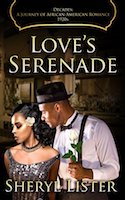
Love’s Serenade by Sheryl Lister (self-published: historical m/f):
Let’s cut right to the first, irresistible hook: He steals her sheet music!
Smooth-talking piano player Miles Cooper convinced good-girl church singer Leigh to run away with him to the big city—then snuck out of the boardinghouse while she slept and took her sheet music with him. It’s so much worse than just breaking the girl’s heart. I could cheerfully have murdered the man for this, and I couldn’t wait to see how the author could possibly redeem him.
Years later (but mere paragraphs in book time) Miles comes back, all soulful eyes, begging for a second chance.
So Leigh—by now a successful speakeasy singer—punches him. Right hook to the jaw, no hesitation. He laughs, admits he deserved it, and promptly hands her the sheet music back.
Reader, I was delighted. Just like that, we’re on an even playing field again. Miles and Leigh are cautious, cagey types—except when they’re together, when they just can’t seem to hold back. This book is as bold and direct as red lipstick, the prose light and clean as an old and well-worn song. I wish the emotional arc wasn’t interrupted in the middle by what felt like an unnecessary conflict from the heroine’s past. But the sense of place and time is gorgeous, and I’m an easy mark for a Harlem-set historical with a cameo by Zora Neale Hurston. This book is number four in the Decades series, which features one African-American historical romance from every decade from 1900 until 2010—so if you’re looking for stories from lesser-seen historical eras then this is definitely something you’re going to want to look into.
The next song started, and Leigh froze. She’d recognize that piano style anywhere. It can’t be. Her heart started pounding. She whipped her head around and her gaze collided with the one man she thought she’d never see again.
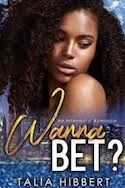
Wanna Bet by Talia Hibbert (self-published: m/f contemporary):
This is one of those rare romances that feels…comprehensive. The romance is not just one episode in the character’s life, but the key to the meaning of the whole. The book has to jump around a bit in time to accomplish this, which means the pacing is somewhat measured, but the time is very well spent. We’ve gotten to know heroine Jasmine well enough that by the time hero Rahul shows up, we can fill in her reactions to their meeting while we’re learning his. And then perspective switches, and we’re filling in Rahul’s thoughts while Jasmine narrates. Normally you only get that kind of layered double-reading pleasure quite late in the romance; having it turn up so early and so often is a real delight.
That’s not the only pleasure Talia Hibbert has to offer. Lyrical prose, electric dialogue, and I had to stop every chapter and remind myself to breathe because this book is pining with a capital P. Jasmine is sharp, dazzling, and fierce; she’s also fragile, cagey, and too proud to ask for what she wants most. Rahul is outwardly rock-steady but secretly a live wire of lust and overanalysis and unspoken hope. I have seen too many Bollywood movies for that name not to conjure visions of Shahrukh Khan, which gives an extra-fun kick to the pining and to the (many, gorgeous) sex scenes. Normally in a romance I feel more pulled toward one of the protagonists (the hero here, the heroine there): this book is one of the glorious times I get to fall headlong in love with both characters. I laughed. I cried. I damn well cheered. And then, when I was good and caught, this book took all the charm and the poetry and the yearning and shaped it into a knife to slice my heart into pieces—then fused it back together with seams of glittering gold, because you shouldn’t forget where the breaks were. It’s the faults that make something loveable. In sum: one of the greatest friends-to-lovers romances I’ve read in many years.The days passed slowly, all at once. Summer dripped over the city like spilled honey. Jasmine found herself disturbingly and unnaturally happy, and it was all Rahul’s fault.
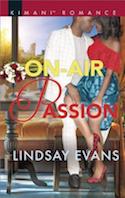
On-Air Passion by Lindsay Evans (Harlequin Kimani: contemporary m/f):
It’s a damn shame Harlequin is shutting down their Kimani line (romances focused on black and African-American characters) just at the point when the demand for inclusive romance is greater and more vocal than ever. A ton of the category romances (the genre term for short romances published on a monthly basis by Harlequin, Silhouette, Mills and Boon, and others) I’ve read in the past few years have been Kimanis. I’ve talked about romance novels being like champagne, but categories are more like a rosé: they’re pleasing, approachable, and best consumed in the same year they’re made.
This gem from Lindsay Evans has everything a category should: tight conflict, snappy prose, and character chemistry hot enough to burn the letters right off the page. Retired pro basketball player-turned-radio host Ahmed Clark thinks love is an illusion that distracts people from working toward meaningful change (for once it’s the hero with the activist’s social conscience!). Elle Marshall believes love gives humans hope, and has come on the show to promote her Atlanta business setting up memorable dates for couples. It’s hate at first sight, but the studio forces them to go on a date to milk the publicity, and of course the friction is mostly fueled by unacknowledged lust. Of course we know how it’s gonna end—we always know how it’s gonna end—but what keeps it from being predictable is the way Lindsay Evans knows how to zing a reader just when she gets comfortable. Touches of humor, wry observations, and beautifully comic descriptions add layers while the plot hurtles through the ups and downs: for instance, this early description of station owner Clive Ramirez, who “loved what he did for a living, fairly treated the people who worked for him, and loved drama like a teenage girl. But everybody had to have a hobby.”
Every emotion in this one is dialed up to eleven, every mistake is compounded, every feeling is wrung out of the characters. It’s a juicy, tart-sweet roller coaster of a read. Not every note lands—I could have done with much more of a grovel from our hero—but that feels sort of separate from the way this book is so good at rewarding a reader’s time and attention. It was like I’d been invited into a marvelous party: even the annoying bits are fun to talk about the morning after.
”Did you just say all those terrible things to that girl and then let her walk away?”
"Why were you so mean to her?”
“Are you super-paranoid?”
“What did she do to you?”
“Did you sleep with her and then basically just curse her out on the radio?”
“Ahmed, you’re messing up, man.”
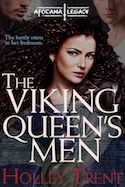
The Viking Queen’s Men by Holley Trent (self-published: paranormal m/f/m)
One of the reasons I love paranormal romance is the way authors are glad to head straight to Bonkersville by the fastest train. This gem from a few years back is a steamy series-starter ménage about a race of psychic matriarchal Vikings in the southwest, the telepathic branch of whom live in an isolated McMansion compound and the empathic branch of whom pose as a biker gang around a pub called the Longship. There are ancestral ghosts giving advice and sex that unlocks magic powers and finally, finally someone writing fated mates as plot complications and not mere excuses for in-book stalking and jealousy.
It’s all completely extra and I ate it up with a spoon.
Our heroine Tess is a former foster kid, a jailbird, and a stone-cold badass. Her voice is hard-bitten and bluntly funny and so lonely you ache in glorious sympathy. I wanted to hug her, then hand her a whiskey and tell her to kick back, then fight any of her enemies who dared to show their face. It makes total sense that our two heroes, smooth corporate type Harvey and ax-wielding biker Oliver, feel similarly: Harvey grew up in the same foster system as Tess, and Oliver has been having dreams of her for several years running. Now that she’s the crowned queen of the Afótama (read: psychic Vikings) she has to work out what her specific psychic talents are, solve the mystery of who kidnapped her away as a child, and negotiate an emotional and sexual balance with two dudes who don’t realize right away that they aren’t rivals and that she intends to keep them both. Hey, her dead many-times-great-grandma Viking thinks it’s a splendid idea, so why not? The whole tower of cards would collapse into a mess in a moment if it weren’t grounded with a live wire of an earnest, irresistible yearning to belong. Which is to say: yes, the psychic Viking ménage book made me cry. Book one ends on a bit of a cliffhanger, but if you like Shelly Laurenston’s shifters (boy, do I!), this series is going to be right up your alley.
"For fuck’s sake." She needed to get her head out of the real world. They weren’t going to resolve their dilemma like reasonable people, because they were Vikings.
This Month’s Aerospace Engineer/Astronaut Heroine Who Can Have it All
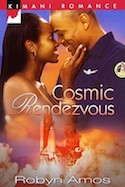
Cosmic Rendezvous by Robyn Amos (Harlequin Kimani: contemporary m/f):
Unlike governesses, cowboys, or BDSM sex club proprietors, astronaut heroes and heroines are not common enough to count as their own romance subgenre. I still read every one I can find (like this small sampler) because of how they dramatize one of the big tensions of romance: Staying versus Leaving. Space is big! It’s dangerous! It’s distant! It’s the farthest Away a human could possibly get! Space is the opposite of home. A lot of non-romance astronaut stories revolve around this idea as well: Gravity, Interstellar, and Apollo 13. So in order to Stay—since any HEA depends upon the protagonists Not Leaving—the astronaut hero or heroine has to forgo going into space. Which is a big deal, because they’ve worked all their life to get into space, and also because space travel is so strongly associated with positives like nobility/knowledge/adventure. An astronaut hero or heroine always has to find a reason to knowingly, willingly choose domesticity. It is a sacrifice.
Unless you’re Shelly London, the heroine of Cosmic Rendezvouz.
Shelly is an aerospace engineer who has designed a new kind of capsule. She dreams of being the one to fly it into space, so she’s applied to the astronaut program, only to be turned down over and over (spoiler: because her overprotective Senator mother keeps leaning on the officials, it’s awful, I loved it). Our hero Lincoln is a hotshot test pilot and astronaut golden boy: he made a famously daring emergency shuttle landing that landed him on the cover of Time magazine. So the tension in this romance is not just that Shelly finds Lincoln inconveniently attractive: it’s that he breezily, effortlessly embodies everything she’s fighting to achieve. It’s frustrating as hell.
And because I’ve read quite a lot of romance, and a lot of astronaut romance, I fully expected there to be some reason why Shelly would never achieve her dream. Astronauts have to resist the temptation of space, and a lot of romance heroines have to learn that Career is Less Important Than Living Life, or whatever. I braced myself for the coming disappointment.
Wrong again! After a suspense plot involving sabotage—the less said about this the better—Shelly becomes an astronaut. A great astronaut. With her own solo picture on the cover of Time and everything. Because of course the Staying versus Leaving dynamic presumes one partner has no choice about staying. That game was rigged and I never noticed.
But Shelly is given the choice. She chooses space because she wants it. She chooses Lincoln because she wants him, too. This book is about a heroine—a black heroine—coming to realize that she doesn’t have to sacrifice any part of herself in order to be happy.
And that’s the kind of book I’ll never get tired of.
